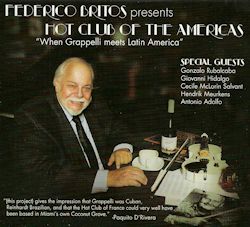1. The Sheik of Araby
2. J’Attendrai
3. I’m Confessin’
4. Djangology
5. La Vie en Rose (English version)
6. Dark Eyes
7. Mélodie au Crépuscule
8. Exactly Like You
9. Nuages
10. Honeysuckle Rose
11. Tears
12. La Vie en Rose (French version)
Federico Britos – Violin
Jorge Garcia – Guitar
Felix Gomez – Piano
Edwin Bonilla – Percussion
Renyel Rivero – Bass
Carlomagno Araya – Drums
Hendrik Meurkens – Harmonica (track 2)
Gonzalo Rubalcaba – Piano (track 3)
Cecile McLorin Salvant – Vocals (tracks 5, 12)
Antonio Adolfo – Piano (track 7)
Jamie Ousley – Bass (tracks 2, 7)
Claudio Spiewack – Guitar (tracks 2, 7)
Rafael Solano – Percussion (tracks 2, 7)
Javi Schneider – Piano (tracks 2, 7)
String section
(tracks 3, 5, 9, 12)
Federico Britos, Elias Gamic, José Montoto – Violins
Viera Borisova, Nelson Armitano – Violas
Constatin Litvinenco – Cello
Renyel Rivero - Bass
My heart sank when I saw that this album was by a band called “Hot Club”. I assumed it would be a group of musicians trying, probably inadequately, to
replicate the music of the Hot Club of France, with all the glories of Django Reinhardt and Stéphane Grappelli. The clincher was that one of the tunes they
were trying to play was the extremely hackneyed Nuages.
How wrong could I be? This is a Hot Club with a significant difference. Certainly they are fronted by a violinist and guitarist, but they also include a
pianist and two extra percussionists on top of the usual Hot Club line-up. As soon as I heard the first track, I realised that this ensemble was producing
an enticing mixture of gypsy jazz with Latin-American rhythms. There was no sign of the turgid beat of some Django-imitators; instead, here was a bright
buoyant rhythm underpinning the other instruments. And just look at the names of the musical guests! People as talented as Gonzalo Rubalcaba and Hendrik
Meurkens would hardly play with a second-rate band. The sleeve-notes are even written by Paquito D’Rivera, which is a fine acknowledgement from a fine
musician.
The Sheik of Araby
is given a punchy introduction before settling into a happy beat, powered by Edwin Bonilla, a marvellous exponent of bongoes, timbales and conga drums.
Federico Britos’ style on the violin is a cross between Stéphane Grappelli and Stuff Smith. This Paraguayan musician is apparently well versed in
all kinds of music, from opera to jazz via chamber music.
Hendrik Meurkens is the first of the notable guests to step forward, adding his harmonica to J’Attendrai. A string section enters mistily for an
unusual arrangement of I’m Confessin’, featuring the subtle piano of Gonzalo Rubalcaba. The eddying Djangology raises the heat with good
guitar, violin and bowed bass solos. La Vie en Rose introduces vocalist Cecile McLorin Salvant, who performs the song in English and later in
French. She sings pleasantly, although she slurs some words which doesn’t make them all clear. The string section is used here to add atmosphere.
Guest conga drummer Giovanni Hidalgo opens Dark Eyes, possibly in collaboration with Edwin Bonilla. The staunch drumming continues throughout the
track. Federico’s violin emphasises the “gypsy” in “gypsy jazz”. Joseph Reinhardt’s Mélodie au Crépuscule introduces pianist Antonio Adolfo with a
spacious solo. The next three tunes are well-worn standards but the group manages to make them fresh with clever breaks and phrasing in the arrangements.
Reinhardt & Grappelli’s Tears is one of their lesser-known compositions (at least, to me) but the group delivers it attractively, with a neat
piano solo.
This album taught me a lesson: never judge a CD by its title! I would like to hear more of this unique group.
Tony Augarde
www.augardebooks.co.uk
